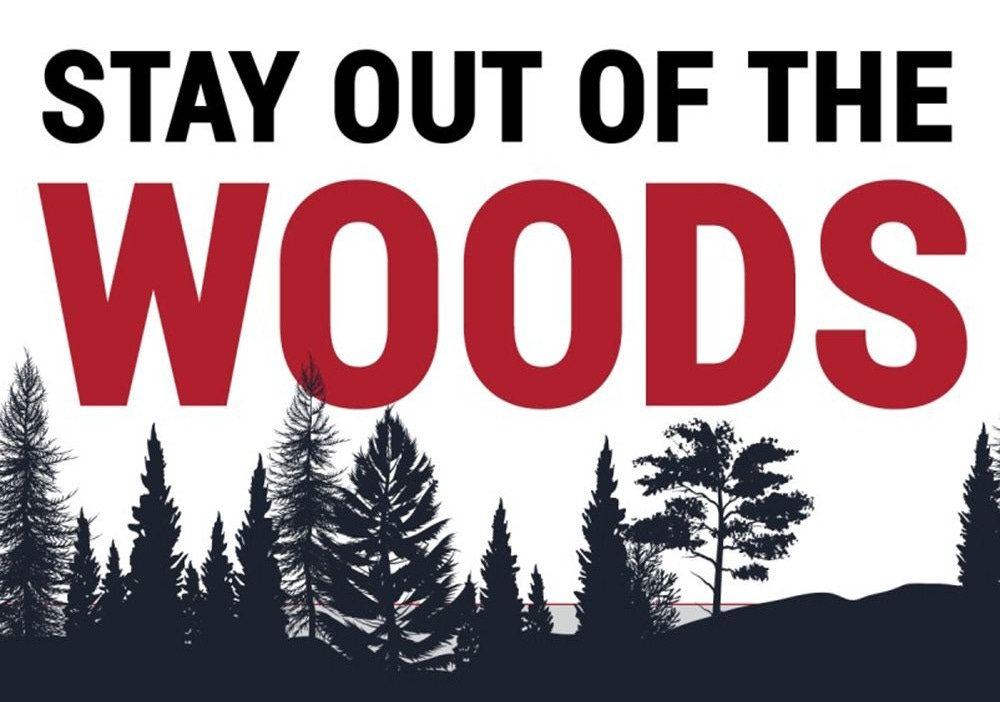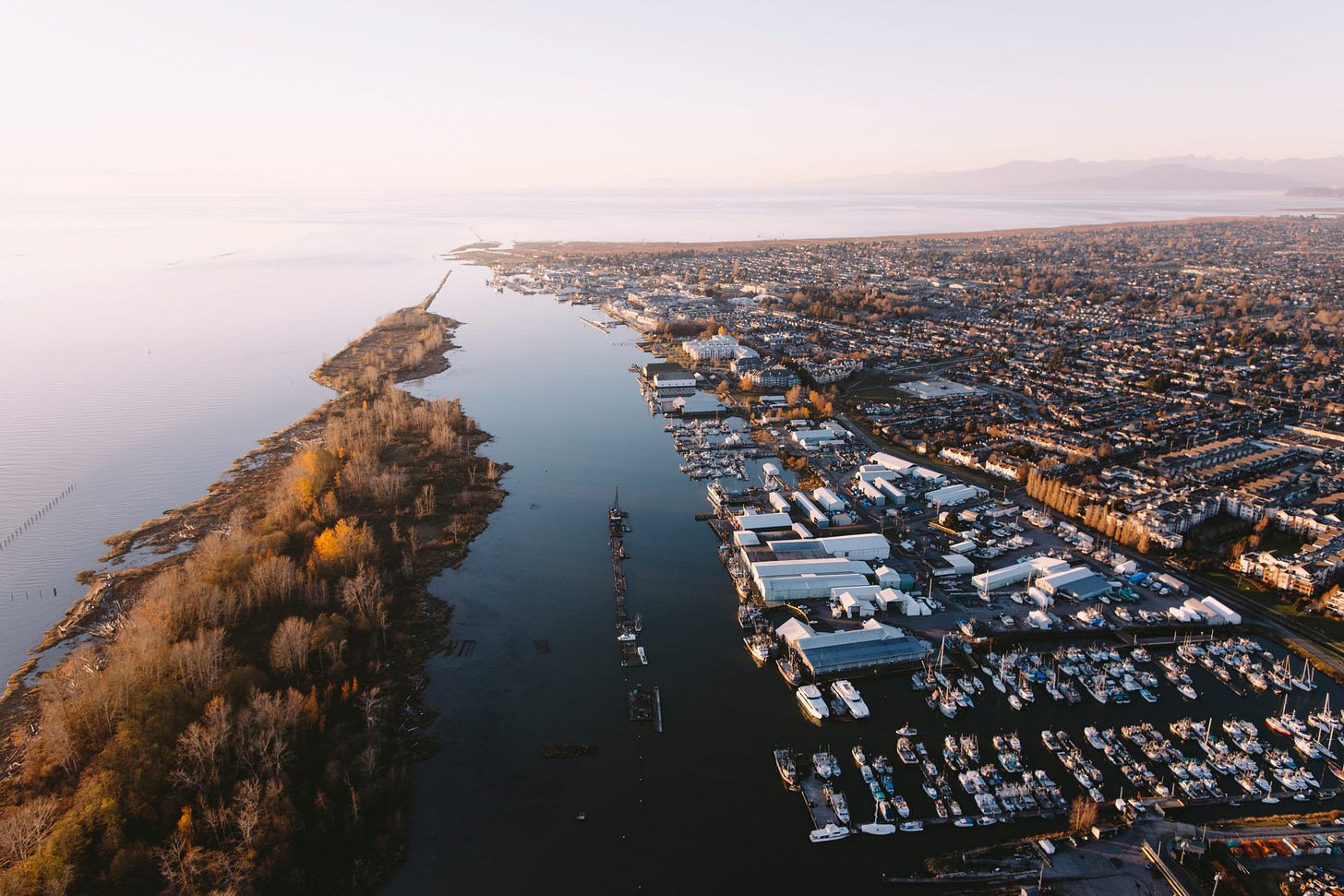Good morning, it’s Monday, August 11th. In today’s news, Wildfire restrictions turn into backyard lockdowns across Atlantic Canada, How Canada’s justice system was built to fail, Historic land claim win could reshape property rights in Canada, US puts $50 million bounty on Maduro as relations with Venezuela shift, and much more.
First time reading the daily blend? Sign up here.
From Fire Bans to Backyard Lockdowns: Atlantic Canada’s New Crackdown
Two months to flatten the wildfire curve? Across Atlantic Canada, sweeping bans are locking people out of the outdoors—sometimes even their own backyards—in the name of fire prevention. What started as “burn bans” in past years has now expanded into outright restrictions on movement, recreation, and private property use.
Fire bans themselves are not the problem. Under certain conditions—prolonged drought, high winds, and tinder-dry forests—they’re both rational and necessary. But stopping people from hiking, fishing, or simply interacting with nature—activities that pose no realistic fire risk—is arbitrary authoritarianism.
New Brunswick has closed all Crown land trails to ATVs, hikers, campers (outside campgrounds), and fishers, citing “unprecedented” dry conditions and an out-of-control 240-hectare wildfire near Miramichi. Private land remains open, though landowners are urged to be cautious. Forestry operations are halted.
Nova Scotia has gone much further. The Houston government has banned hiking, camping, fishing, and vehicle use in any forested area—public or private. Landowners can use their wooded property but cannot host others. Violators face a $25,000 fine, inflated to nearly $29,000 with taxes and surcharges. The ban could last until October 15. Critics, including the Canadian Constitution Foundation and the Canadian Civil Liberties Association, call the rules “draconian” and “grossly disproportionate.”
Newfoundland and Labrador has taken a targeted but severe penalty approach, increasing fines for breaching the fire ban from $50,000 to $150,000, with possible jail time of up to a year.
Prince Edward Island has revoked burn permits but still allows fires for warmth or cooking. In national parks, fines can reach $25,000.
Nova Scotia has already issued at least ten tickets this year. One went to Canadian veteran Jeff Evely, who deliberately walked into the woods in Coxheath to force a court challenge after being denied standing last year. His $28,870.50 ticket could become a constitutional test of whether punishing a harmless walk with life-altering penalties violates Section 12’s protection against cruel and unusual punishment.
All of this proves something many Canadians suspected: our governments can crack down on crime and enforce serious penalties—they just choose not to. Law-abiding citizens on a hike now face harsher consequences than temporary residents who commit violent crime. This is collective punishment: the masses paying for the actions of a reckless few.
By all means, prosecute arsonists to the full extent of the law. But don’t weaponize the law against ordinary Canadians while letting actual criminals slip through the cracks.
Crime Without Consequence: Canada’s Justice System Was Built to Fail
Over the past several months, provincial premiers and justice ministers have been loudly demanding that Ottawa fix Canada’s crime problem. Their shopping list is straightforward: scrap bail for certain offences, bring in a “three strikes” rule for repeat offenders, and stop what they call the “catch and release” approach that puts accused criminals back on the streets.
It’s a message designed to sound tough. But it’s also a convenient half-truth. Because the reality is, even if Parliament passed every one of these measures tomorrow, the provinces couldn’t enforce them. Canada’s justice system isn’t just soft—it’s structurally incapable of backing up the talk. And that is something every level of government already knows.
Crime Rates Without the Consequences
Canada’s crime index—a measure of the volume and severity of crime—is virtually identical to peer nations like the United States, the UK, and Australia. Yet our incarceration rate is drastically lower:
Canada: 90 inmates per 100,000 people
United States: 541 per 100,000
UK: 139 per 100,000
Australia: 162 per 100,000
Mexico: 175 per 100,000
(Source: World Population Review, 2024)
The takeaway is stark: Canada experiences a similar level of crime to countries that lock up far more offenders. The gap between crime and consequence is the space where organized crime thrives. If you’re a repeat offender in Canada, the odds are good you’ll avoid prison altogether—or get out quickly, even if you do land there.
The Infrastructure Deficit
The United States operates more than 6,200 prisons, jails, and detention centres. Canada? Just 301 facilities, and that includes treatment centres and community programs, leaving only 50 true penitentiaries in the entire country. Ontario—home to nearly 15 million people—has only 32 provincial facilities. Some are so overcrowded that, as Ontario’s Ombudsman Paul Dubé revealed, inmates are being housed in broom closets and converted storage rooms.
This isn’t a sudden crisis—it’s decades of underinvestment catching up. While politicians posture about tougher laws, they’ve consistently failed to fund the infrastructure that would make those laws enforceable.
The Blame Game
Here’s where the hypocrisy—and the quiet collusion—comes in. Provinces blame Ottawa for weak bail provisions. Ottawa points out that running prisons and remand centres is the provinces’ job. Both are right, and both are wrong.
Provinces want tougher laws without paying for the extra cells, guards, and court capacity those laws would require.
The federal government wants credit for crime bills without funding the provincial systems that would actually enforce them.
The result is a justice system that has completely fallen apart.
Criminals Know the System Is Broken
When organized crime leaders know the jails are full and bail is a revolving door, they don’t just keep operating—they expand. They can recruit with the implicit promise that “even if you get caught, you won’t be inside for long.” This is how gangs and criminal networks entrench themselves. And with the RCMP identifying 140,000 gang members already embedded across Canada, the trajectory is clear: without the capacity to detain and disrupt them, their numbers will only grow.
The Real Fix—If Anyone Wants It
If Canada is serious about public safety, it has to start with the unglamorous work of building capacity: more facilities, more staff, more courtrooms, and a coordinated federal-provincial plan to ensure crime laws are matched with enforcement muscle. Without that, new laws are just political theatre—and criminals know it.
Until then, Canadians are being sold a fiction: that the crime wave is someone else’s fault. In truth, every level of government owns it. And their failure to act isn’t just negligence—it’s an open invitation to the people already tearing our communities apart.
Historic Land Claim Win Could Reshape Property Rights in Canada
On August 8, 2025, the B.C. Supreme Court issued a landmark ruling granting Aboriginal title to a coalition of Coast Salish First Nations over 750 hectares in Richmond, part of Metro Vancouver. This is one of the most significant urban land title decisions in Canadian history, with implications for property rights, infrastructure, and future development.
The ruling comes after a years-long trial involving the Quw’utsun Nation, Cowichan Tribes, Stz’uminus First Nation, Penelakut Tribe, Halalt First Nation, and Cowichan descendants. The contested land includes urban areas, farms, golf courses, commercial property, and port lands.
The court’s declaration does not automatically strip away private property or dismantle existing infrastructure. However, it orders the federal and provincial governments to negotiate in good faith to reconcile fee-simple ownership with Aboriginal title.
This means that municipalities, developers, and private landowners may find themselves in future negotiations with title-holding nations over land use and development. While private property rights remain in place for now, the decision opens the door for challenges, compensation claims, or co-management agreements.
Richmond officials previously warned that such a declaration could “put $100 billion in infrastructure at risk.” While the court downplayed immediate disruption, it acknowledged that the land was historically unoccupied and undeveloped by non-Indigenous settlers at the time of Crown assertions of control—meaning legal title never rightfully passed from the Cowichan people.
From a legal standpoint, Aboriginal title grants the right to decide how land is used, to occupy it, and to benefit from its resources—with the limitation that it must be preserved for future generations. This case builds on previous Supreme Court decisions but takes the concept into a densely populated urban setting, where overlapping interests create complex legal and political challenges.
In the broader context, this ruling signals a shift in Canadian property law. It reinforces that Aboriginal title is not just symbolic—it carries tangible, enforceable authority. For governments, it raises the stakes in ongoing land claim negotiations. For the public, it’s a reminder that much of Canada’s land base—urban and rural—remains contested, and future rulings could reshape ownership patterns far beyond the courtrooms of British Columbia.
US Puts $50 Million Bounty on Maduro as Venezuela Relations Shift from Diplomacy to Law Enforcement
Deputy Secretary of State Christopher Landau declared that US relations with Venezuela have shifted from diplomacy to law enforcement, calling Venezuela’s government a "criminal gang" led by Nicolás Maduro. This follows the US doubling the reward for Maduro’s arrest to $50 million—the largest in US history, twice that offered for Osama bin Laden.
The US hopes for a swift restoration of Venezuela’s constitutional government. Meanwhile, Venezuela’s Foreign Minister dismissed the reward as political propaganda. The US Treasury designated the “Cartel of the Suns,” led by Maduro and top officials, as a global terrorist group involved in narcotics trafficking and collaborating with other criminal cartels to harm American communities. More
Nuclear Revival: America’s Answer to Soaring Tech Power Demands
The rapid growth of cloud computing and generative AI is driving a massive surge in electricity demand from US data centres, which are projected to consume over 30 times more power by 2035 than today. Currently, US data centres use about 33 gigawatts (enough for 27.5 million homes), expected to rise to 176 gigawatts. To meet this demand, government and tech giants are investing heavily in nuclear energy—long vilified but now seen as a reliable, clean power source. Nuclear power, which supplied 19% of US electricity in 2024 despite representing less than 8% of capacity, is poised for massive and rapid expansion through new federal directives and corporate investments, including projects by Amazon, Microsoft, and others.
President Trump’s 2024 executive orders aim to quadruple US nuclear capacity by 2040, fast-tracking new reactors and regulatory reforms. Small modular reactors, backed by $800 million in federal funding, offer rapid deployment potential, with test sites like Idaho National Laboratory working closely with tech companies. While public support for nuclear energy is strong (61% favorability per recent polls), safety concerns linger due to past accidents like Three Mile Island and Fukushima. More
Newfoundland Declares Regional State of Emergency as Wildfires Force Nearly 3,000 From Their Homes - More
Claudia Sheinbaum Says US Military Will Not Be Allowed to Operate in Mexico - The Mexican president rejected talk of a US troop deployment in Mexico, amid reports that Trump has authorized military action against cartel organizations. More
Trump and Putin to Meet in Alaska on August 15 to Discuss Ukraine Peace Deal - More
UK Police Arrest Nearly 500 at Protest Supporting Banned Palestine Action Group - More
20 Alleged Mossad Spies Arrested in Iran—Regime Says it 'Will Make an Example of Them All’ - More
Instagram Under Fire For New Location Sharing Feature
Democratic and Republican lawmakers are jointly urging Meta to shut down Instagram’s new map feature over child safety concerns, warning that location-sharing tools could expose minors to predators. The feature allows users to share their location and view an interactive map of geotagged posts that disappear after 24 hours. While parents receive notifications when their child shares a location and can disable access, Senators Marsha Blackburn and Richard Blumenthal criticized Meta’s safety record and called for stronger protections in a letter to CEO Mark Zuckerberg.
Meta responded that the map is off by default and location sharing only occurs with user consent and limited to approved followers. Instagram head Adam Mosseri emphasized users can control who sees their location, sharing his own cautious use of the feature with close friends. More
Federal Think Tank: Cutting 64,000 Public Service Jobs Could Save Canada $10 Billion - More
Africa Set to Test Critical Minerals-Backed Currency - Africa’s move is aimed at decreasing dependence on foreign powers for money and gaining maximum reward from the continent’s natural resources. More
What 'Tax the Rich' Really Looks Like: London’s Wealthy Continue to Flee as New Taxes Target Uber-Rich - According to Henley and Partners, Britain will lose 16,500 wealthy individuals in 2025, up from 10,800 in 2024. More
China Plans to Build a “Deep-Sea Space Station” 6560 Feet Under Water
China is building an underwater research station—dubbed a “deep-sea space station”—to be completed by 2030 at depths over 6,500 feet. This permanent facility will allow scientists to live and work underwater for up to a month, enabling continuous study of deep ocean environments like cold seeps, which hold key clues to ecosystems and alternative energy sources.
Equipped with advanced technology including unmanned submersibles, seabed observatories, and life support systems, the station faces huge engineering challenges from extreme pressure and communication needs. Positioned likely in the resource-rich and geopolitically contested South China Sea, it also strengthens China’s strategic foothold amid territorial disputes.
Once operational, the station promises to revolutionize marine science by offering unprecedented, long-term access to deep-sea habitats, helping track ecological changes, seismic activity, and potentially discover new resources and medicines—ushering in a new era of ocean exploration. More
Scientists Discover Amino Acid Switch That Turns Fat into a Calorie-Burning Furnace - Researchers found that lowering cysteine sparks the conversion of white fat into heat-producing brown fat, boosting metabolism and promoting weight loss in both humans and animal models. More
Two Japanese Boxers Die from Brain Injuries on Same Fight Card
Two Japanese boxers, Shigetoshi Kotari and Hiromasa Urakawa, both 28, tragically died from brain injuries sustained in separate fights on the same Tokyo boxing card at Korakuen Hall. Kotari collapsed after a 12-round draw and died following emergency brain surgery for a subdural hematoma. Urakawa suffered a similar injury during a knockout loss and also passed away despite surgical efforts. The World Boxing Organization expressed condolences, mourning the losses and honoring their fighting spirits. In response, the Japan Boxing Commission has reduced all Oriental and Pacific Boxing Federation title bouts from 12 to 10 rounds. Earlier this year, Irish boxer John Cooney also died from fight-related brain injuries, highlighting ongoing safety concerns in the sport. More
Jaguars' Cam Little Hits a 70-Yard Field Goal in a Pre-Season Game vs. Steelers - Unfortunately, this does not count as the NFL record—currently sitting at 66 yards—because it was in a pre-season game. More
NASCAR: Connor Zilisch Breaks Collarbone in Victory Lane Fall at Watkins Glen, Misses Cup Series Race - More
Farmer Gives Away $400,000 to the Poor Because God Told Him He Woud Go to Heaven
Panamanian Geisha Coffee Sets New Price Record Selling for $13,705 Per Pound
On This Day in 1988, Al-Qaeda was formed at a meeting between Osama Bin Laden, Ayman al-Zawahiri, and Dr. Fadl in Peshawar, Pakistan



















"It's only for two weeks" is what the government told us during the covid lockdowns. The parks were off limits then too. They put police tape across park benches.
We need keep vigilant on his issue, this could spread to the rest of Canada.